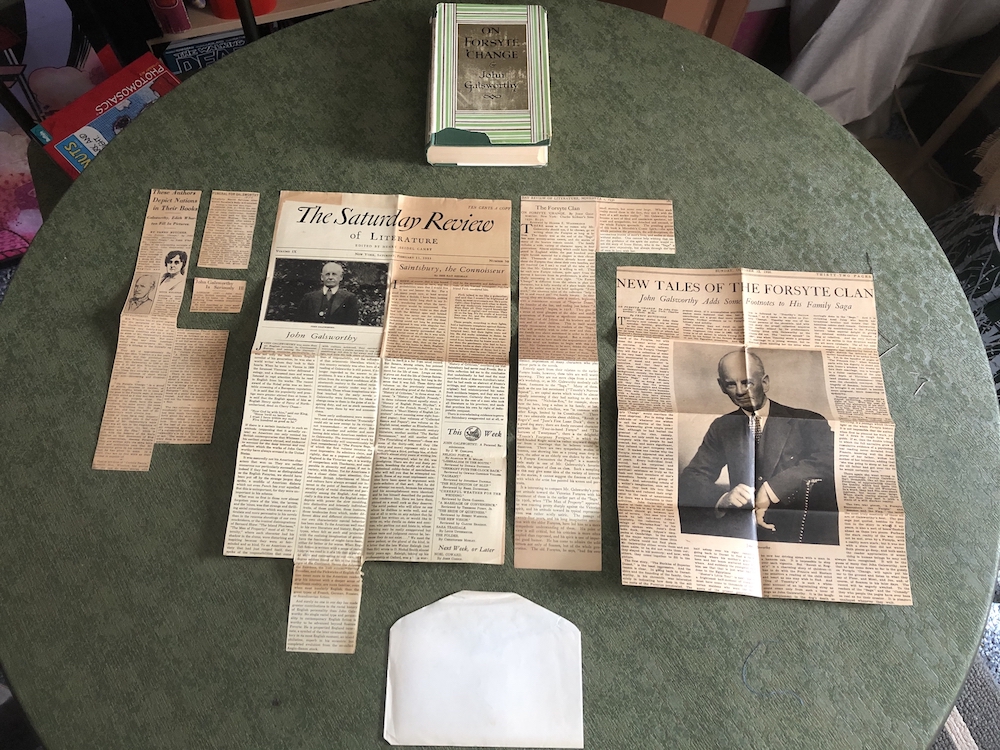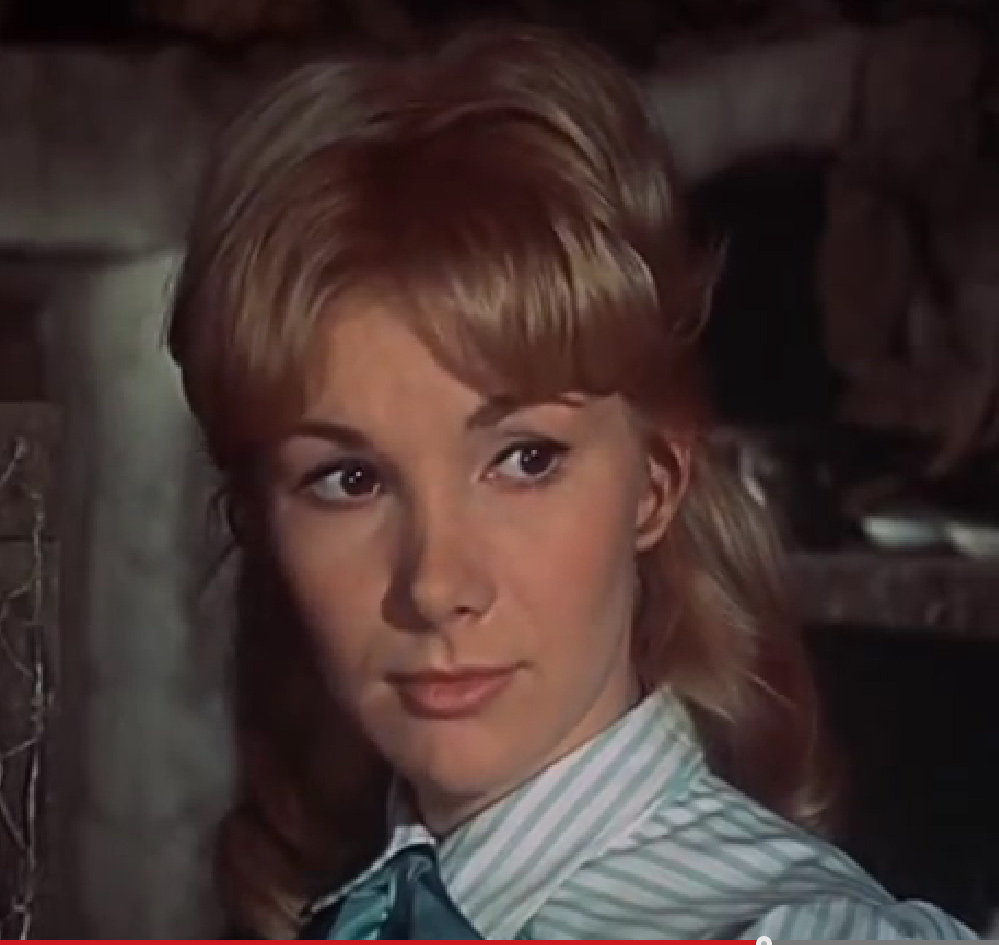If you’ve found this piece because you want information on The Forsyte Saga, you can skip my personal ramblings by clicking here.

Those of you who have kept up with me recently (that’s enough of you to count on two hands and allow for some digital amputations) know that I’ve pretty much gafiated from science fiction fandom.
For the unenlightened:
GAFIA (“getting away from it all”) + -ate
To drop out of fandom community activities, with the implication of “getting a life”.
I don’t know about the “getting a life” bit, because being part of SF fandom has been quite a life for most of the last 40 years. But my relationship to the community has, as Robert A. Heinlein once noted about dying relationships, begun to stink like rotten fish. I won’t go far into the details. I’ll just say that I feel like a misfit in fandom, the place one used to go to be a misfit and still be accepted. Alas, now it’s just a community of like-minded and judgmental cool kids, like any other clique.
So I’m out. Okay, I’ll say a little more. Stories are meant to reach out across gaps and establish a connection. The stories being absorbed by fans these days do not do that for me. There are a few exceptions: the Marvel movies, The Umbrella Academy and a few such shows, Stranger Things. Most of those work for me, though, because they hark back to the past, to the things I enjoyed when I was young. But even the majority of content meant to capture the eyes and ears of people my age doesn’t work for me. I’ve watched four episodes of “Discovery,” one of “Picard.” I’ve never seen The Orville.
“How can you not watch those, Steve?” a fan demanded of me. I told him it was simple: Star Trek lived for me from 1966 until 1991, and then it was over. I could be entertained by some of the sequel properties—although I now find “Next Gen” badly dated, and I never watched even half of the runs of the others—but I’m not passionate about any of it.
As my passions cool with age, “not passionate” pretty easily becomes “don’t care about at all.” I’m the same way with comics, although I still read some of the new ones. They’re created to reach an audience that’s not me, across a divide that’s so narrow it might fit inside the minds of most modern fans. In other words, they’re by modern comics fans for modern comics fans.
And SF prose fiction? Mama always said if you couldn’t say something nice, don’t say anything at all.
I never called my mother “Mama,” and she never said that. So I’ll say it: Modern published SF panders to a fandom that wants its pre-existing ideas reinforced, never challenged, and wants its positive reinforcement packed in long series of six-inch-thick books with numbers on the spines, so it knows in what order to suck the teat of self-encouragement. Oh, and, of course, it wants its fiction to stick it to the man, as long as he’s safely made of straw.
I still read. I still watch some TV. I still see movies, albeit not in theaters. But my interests are going in other directions. I want to hear the voices of people whose ideas will stand the test of time. And the only way to be sure you’re doing that is to absorb the ideas of people who have been around for a long, long time. They may be dead. Most of them are. That’s okay. They live in their work. And the fact that they continue to live in their work is testament to the importance of their ideas.
I spend a lot of time now reading James Hilton, H.L. Mencken, Mark Twain, and, among others, John Galsworthy. I discovered Galsworthy in a roundabout way. I’ve always liked the British actress Susan Hampshire. I knew her from a Leonard Nimoy TV movie called Baffled!, from Disney’s The Three Lives of Thomasina, and from the long-running Scottish series Monarch of the Glen. She’s one of those people who captivates her audience with laughing eyes and an impish, intelligent voice. She’s played opposite the likes of Patrick McGoohan and Richard Bryers. In 1967, she became world-renowned playing in the BBC’s The Forsyte Saga. It was the family saga that, long before Downton Abbey, launched Masterpiece Theatre and earned the ire of British clergy because their congregations stayed home by the tens of thousands on Sunday evenings to catch the latest episode.

When I got hold of a copy of the series, I was disappointed to learn that Ms. Hampshire doesn’t appear for the first half of it. She plays one of the third generation of Forsytes, whose character is born a dozen episodes in. Still, after watching one episode, I decided not to skip ahead. The story grabbed me, in a way no dedicated fan of space opera and super-heroes would expect to be grabbed by a staid tale of middle class people’s births, deaths, marriages, divorces, affairs and scandals. It was all so mundane… but it still grabbed me.
Finishing the series, I decided to pick up copies of the novels, published between 1920 and 1930. I was pleased to discover John Galsworthy’s very readable style, his dry wit, and his even-handedness in dealing with the political philosophies and social issues of his time. (And if you think the issues of England in the 1920s are not relevant in the U.S. a century later, you need to turn off the idiot panel’s stream and read more history.) I’m still working my way through the nine novels and several interludes that make up the original saga. I just finished volume five, The Silver Spoon, and then watched the second season of the 2003 remake of the original TV series. I’ve also listened to the BBC Radio adaptation of the entire saga, including the final three books which have never been adapted for film. That’s available on Audible as The Forsyte Chronicles, if you’re interested. It features Dirk Bogarde and is worth your time.
Reading various articles about Galsworthy’s works, I discovered I was missing a book. Shortly before his death, Galsworthy published a collection of short stories about the Forsytes, On Forsyte ‘Change. For a topic to be “on Forsyte ‘change” meant, in the books, that it was something all of the family was talking about, currency on the family exchange. I sought out a copy of the book this week, and was happy to find one at my favorite used book store. It was priced at about twice the cost of the other volumes in the series, but was not costly enough to discourage me. It was a hardbound copy and was bagged. My store doesn’t bag books as a rule, but I assumed they had done so to protect a worn dust jacket. Getting it home, I found another reason for the bag.
Inside the front cover was a slightly yellowed envelope, containing newspaper clippings. Carefully unfolding them—I could tell they had been there a long time—I found they were contemporary to the book, a 1930 London edition. There was a feature article on the book’s release, a tribute to the saga from The Saturday Review of Books, a couple of pieces on Galsworthy’s work, a short note saying that Galsworthy was ill, and, finally, an obituary from 1933. The pieces are a little yellowed, and the exposed sections are brown in places, but they’re crisp and intact. Obviously, the book belonged to a real fan. I was sad that there was no handwritten name or “Ex Libris” plate on the flyleaf.
Still, it was a neat find. I love finding souvenirs in used books. I also love seeing the names of people who owned them, fifty, eighty or a hundred years ago. I’ve occasionally found the address of the owner, letting me have an idea of how far the book has traveled in its life.
I may have the clippings framed. They’re a nice tribute to an author who’s meant a lot to a lot of people, including me.
And they’re yet another reason that I usually prefer an older book that has a history to a new copy.
The articles are here, if you’re interested. I’m too intimidated to handle the paper copies in order to read them.
Does my new life sound boring? I assure you, it’s not. It’s often too interesting. But this is the first thing that’s moved me to write in many months. In the words of Andrew Lincoln’s character in Love, Actually… “I hope it’s… useful.”

That’s very cool, Steven! Awesome gift from the past. I had a couple years of poor health, and I found gutenberg.org I read all the Musketeers, books from the cattle drive days, Colonial Africa and India, cowboy stories, trapping stories, finally read all the Sherlock Holmes, Mark Twain, and many many others, covering my great grandparents and grandparents’ eras and WW II. I remember when I first fell in love with what is now “classic” science fiction. Yes, until our kids and more of our kids’ kids get taught some critical thinking skills, and have real English classes, the merchandising of writing will be pandering to wokeism. I saw a Star Trek book where Kirk “admits” his “white privilege.” Flamed that author and won’t read anything again from him. OMG! So not necessary!
But, some of the kids are alright, and they are starved for the real thing. That gives me hope.
Your life has seemed to me packed with work, family, commitments. I fear anything i say on your current projects will sound cliche, trite. Enjoy this time. Enjoy your wife, family. Thanks for writing to us again.
Lois, it’s great to hear from you! Yes, I guess the generational conflict level has spiked again. I’ve been “Okay Boomered,” and I’m not even a Boomer. As to Kirk admitting white privilege, I consider privilege tbeory to be anathema to Star Trek as I understand it. Gene may have become a hard leftist in later years, but his original creation did not reflect those extreme views. The Trek universe was a place when an individual was judged on the content of his or her character, not on group affiliation. Accepting privilege theory means throwing that out the window and evaluating people only on accidents of birth. The Jim Kirk I grew up with considered “black” and “white” to be adjectives without baggage. But Trek writers stopped knowing who Jim Kirk was about thirty years back.